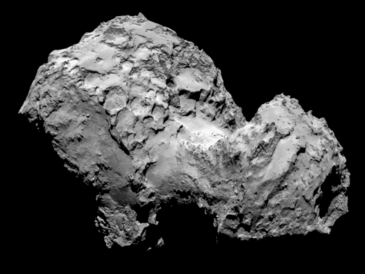The Rosetta space probe took over ten years to reach its objective. Then, on 12th November 2014 it finally arrived at its destination: The comet 67P/Churyumov-Gerasimenko – or Tschuri for short. Since then the mission has not only been holding the scientists involved in suspense. Unfortunately, the landing of the “Philae” module onto the comet did not go quite according to plan, and it was some time before ground control was to know whether the experiments designed to shed light on how our solar system was formed could be carried out. The chemists Professor Wolfram Thiemann (Uni Bremen), Professor Uwe Meierhenrich (formerly Uni Bremen, today the University of Nice) and Dr. JanHendrikBredehöft (Uni Bremen) are involved in the central experiment to be conducted by the landing module; namely, the collection of data to see whether the comet might be carrying the molecular building blocks of life.
Precision landing failed
The landing and subsequent maneuvers were followed on media by audiences around the world. Small wonder, for this was the very first time a module had been soft-landed on the surface of a comet. But the excitement was initially dashed as it became clear that Philae had not set down on the planned spot and could not be firmly anchored on the comet’s surface. As a consequence, the landing module was lying at an angle in a sort of crevice.
Under the circumstances it was anything but clear whether samples of the comet’s surface could eventually be collected for the Bremen investigations. According to Wolfram Thiemann and Uwe J. Meierhenrich, “The backward kick caused by drilling could result in Philae tipping over. If it then fell on its antennae, contact with the module would be broken and it wouldn’t be possible to transfer data”.
Bremen researchers breathe a sigh of relief
The Bremen team was held in acute suspense for a full two days. Then came news of the decision reached by ground control in Cologne: Drilling was to commence. The COSAC equipment (Cometary Sampling and Composition Experiment) installed on Philae proceeded to gather gas chromatographic and mass spectrometric measurements from the collected samples. At 11.30pm on 14th November the researchers managed to restore radio contact with Philae and transmit complete sets of data back to Earth. Just one hour later contact broke off completely, and it couldn’t be restored in the meantime. “What a story!” says Uwe Meierhenrich excitedly. “We lost no time starting to evaluate these unique sets of data.” The scientists hope the data gathered from the four-billion-year-old comet will enable insights into how life began on Earth.
All in all, despite its rather clumsy landing the Rosetta mission can be considered a complete success. The European Space Agency announced that all the ten planned experiments could be carried out and the accordant data successfully transmitted back to Earth. Complete evaluation and assessment of the data will still take some time, though. And with a little luck it may even be possible to recharge Philae’s batteries and carry out further experiments. At the moment, though, it’s a question of just waiting to see what happens.

